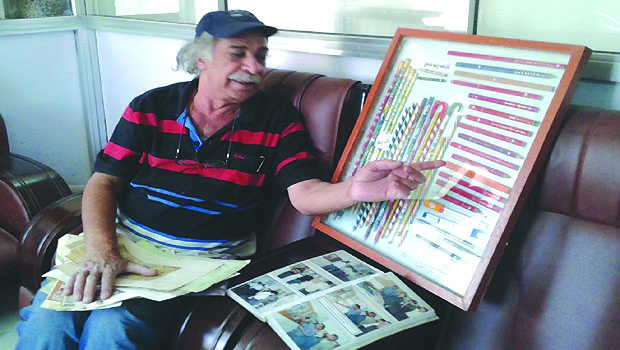
Iraqi journalist and pencil collector Waleed Ibrahim points to a collection of rare pencils. (Asharq Al-Awsat)
Baghdad, Asharq Al-Awsat—Iraqi journalist Waleed Ibrahim believes he has one of the strangest hobbies in the Arab world. Ibrahim, known as Abu Iqlam (The Father of Pencils) to his friends and acquaintances, has been collecting commemorative pencils for more than fifty years and has the largest collection in the Middle East.
He told Asharq Al-Awsat that his love of pencils dates back to his childhood. He says: “A pencil is a simple and cheap writing tool but it is ubiquitous. Everybody will have used a pencil at some stage during their early education; it is something that is inexorably tied to our childhoods. However, in spite of modern developments and technology, the simple pencil is still indispensable.”
Ibrahim delights in telling the apocryphal story of the US–Soviet space race and how NASA spent hundreds of thousands of dollars developing a pen that could write in zero gravity. As for the Russians, they used a pencil. “The same pencil that is used by the youngest children to learn their alphabet has now been used in space,” says Ibrahim.
“I started to collect pencils when I was young, and this hobby developed as I advanced in age. My friends were always providing me with different kinds of pencils,” he says. His collection of commemorative pencils now numbers in the thousands, and includes examples commemorating the reign of Arab monarchs whose dynasties have long turned to dust, as well as sporting and cultural events.
Ibrahim says he wants to enter his collection into the Guinness World Records; the largest collection of pencils is currently recorded as belonging to Uruguay’s Emilio Arenas and consists of 16,260 black pencils from 72 countries.
However the Iraqi journalist is undeterred, pointing to the large number of “rare” pencils in his collection. “I have important pencils, some of which bear the images of Iraq’s kings and presidents, including King Faisal I and [the former] prime minister, Abdel Karim Qasim. I have a pencil which will be 100 years old in 2018 which bears the phrase, ‘The government of Iraq,’ and was manufactured at the time of the British occupation of Iraq,” he tells Asharq Al-Awsat.
Ibrahim’s collection includes pencils that carry their price tag in “fils”—which have been obsolete for more than forty years—and pencils that show traditional Iraqi dress manufactured more than fifty years ago.
“Most of my pencils are Iraqi-made,” he says. “There were three main factories were they were manufactured: Nour, Nasr and Kravat. Today, however, all these factories have been closed. All the pencils in Iraq today are imported.”
As to whether he would ever agree to sell his pencil collection, Waleed told Asharq Al-Awsat: “Pencils, in their abstract form do not have a specific value. Yet my collection of pencils which details Iraq’s history is priceless—nobody can put a price on this.”
Waleed, who has placed his collection on view to the public and is preparing for a new exhibition in Iraq’s Kurdistan region, says his collection of Iraqi-made pencils is a graphite history of Iraq.
